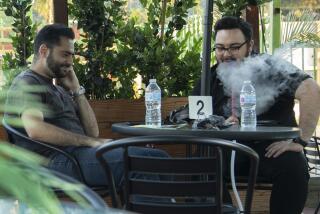N.Y. Cigarette Levies Prove to Be Taxing for Businesses
NEW YORK — Standing behind the counter at Cottage Tobacco, a store on Manhattan’s Upper East Side that sells magazines, newspapers and cigarettes, Charlie Patel bemoaned his shrinking business.
“$4.60 a pack is too much,” he lamented. “No one buys cartons. A lot of people are complaining. Business is down 10%.”
In an effort to curtail smoking and raise money for an ambitious program to provide health insurance to the needy, New York state on March 1 increased the tax on a pack of cigarettes by 55 cents--to $1.11, the highest in the nation. The tariff in New York City is even steeper, $1.19 a pack.
The result for many shopkeepers has been a sharp drop-off in cigarette sales, said James Calvin, president of the New York State Assn. of Convenience Stores, which represents 4,000 retailers.
“The typical convenience store relies on tobacco product sales of 25% to 30% of [its] business,” Calvin said. “It is the No. 1 product category. As ancillary sales, cigarette customers buy coffee, lottery tickets, newspapers.”
But the decline in sales around the city does not necessarily mean smokers are cutting back. Instead, many simply are getting their supply from different sources.
“The Internet is not just for pornography anymore,” joked Eric Feldman, a 24-year-old insurance adjuster, puffing a cigarette downtown in front of a Park Avenue office building. Feldman, a smoker for eight years, says he will buy tax-free cigarettes from Web sites run by Native American tribes.
Calvin said that in recent years the number of Internet sites selling tobacco has grown. Most are operated by Native American merchants, who contend that sovereignty exempts them from state taxes.
So far, New York state has not tested that claim.
While a carton of cigarettes can cost $45 in New York City, an identical box of the same brand can sell for as low as $22.45 on such Web sites as Native Pride, owned by a member of the Seneca Indian nation and operated from the Cattaraugus Indian Reservation in western New York. The site boasts that customers can receive shipments of cigarettes in two or three days.
Native Pride’s Web pages contain a warning that buyers must be at least 21, as does the site of Seneca Hawk, another Internet smoke shop.
“If you do not meet the minimum age requirement, please return to our home page,” Native Pride advises.
Critics charge these warnings are inadequate, and it is all too easy for teenagers to obtain cigarettes, simply by using an adult’s credit card.
Police and some prosecutors also worry that New York’s highest-in-the-nation tax will spur Prohibition-style bootlegging, with organized crime entering the picture.
In the current environment, smuggling truckloads of cigarettes to New York from such states as Virginia, where the levy is a mere 2.5 cents a pack, or North Carolina, where the state tax is only a nickel, can be highly profitable.
In what could be a taste of things to come, Brooklyn District Atty. Charles J. Hynes recently charged four men with trying to sell smuggled smokes. Law enforcement agents seized 2,300 cartons of cigarettes in Brooklyn with a retail value of $100,000.
And although government officials say New York’s soaring taxes were designed to encourage smokers to abandon the habit, physicians so far see no stampede to treatment centers.
“No one brings up the taxes,” said Warren Huberman, a clinical psychologist on the staff of the Joan and Joel Smilow Cardiac Rehabilitation and Prevention Center at the New York University Medical Center. “It is almost like the gas tax. Is it going to stop them from going anywhere?”
“[But] if you have smoker-related deaths in your family and you have some of the illnesses that took your relatives, the risk becomes harder to deny,” Huberman said.
“We see the worst smokers,” added Dr. Elliot Wineburg, assistant clinical professor at Mount Sinai Medical Center. “I don’t think at $20 a pack they would quit.”
More to Read
Sign up for Essential California
The most important California stories and recommendations in your inbox every morning.
You may occasionally receive promotional content from the Los Angeles Times.










